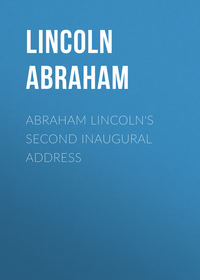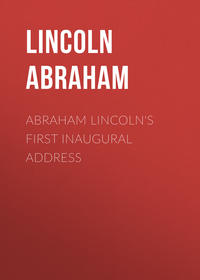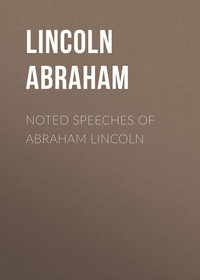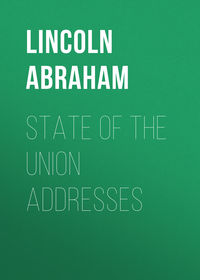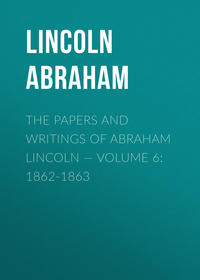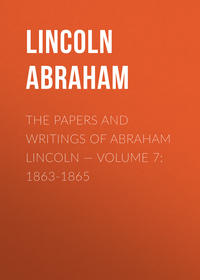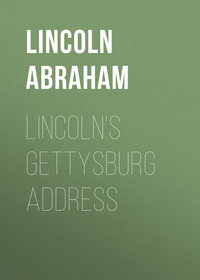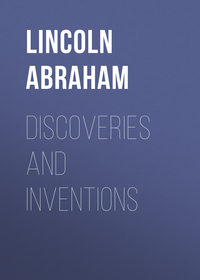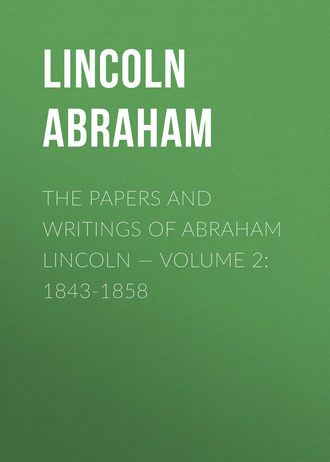 полная версия
полная версияThe Papers And Writings Of Abraham Lincoln — Volume 2: 1843-1858
One great trouble in the matter is, that slavery is an insidious and crafty power, and gains equally by open violence of the brutal as well as by sly management of the peaceful. Even after the Ordinance of 1787, the settlers in Indiana and Illinois (it was all one government then) tried to get Congress to allow slavery temporarily, and petitions to that end were sent from Kaskaskia, and General Harrison, the Governor, urged it from Vincennes, the capital. If that had succeeded, good-bye to liberty here. But John Randolph of Virginia made a vigorous report against it; and although they persevered so well as to get three favorable reports for it, yet the United States Senate, with the aid of some slave States, finally squelched if for good. [Applause.] And that is why this hall is to-day a temple for free men instead of a negro livery-stable. [Great applause and laughter.] Once let slavery get planted in a locality, by ever so weak or doubtful a title, and in ever so small numbers, and it is like the Canada thistle or Bermuda grass — you can't root it out. You yourself may detest slavery; but your neighbor has five or six slaves, and he is an excellent neighbor, or your son has married his daughter, and they beg you to help save their property, and you vote against your interests and principle to accommodate a neighbor, hoping that your vote will be on the losing side. And others do the same; and in those ways slavery gets a sure foothold. And when that is done the whole mighty Union — the force of the nation — is committed to its support. And that very process is working in Kansas to-day. And you must recollect that the slave property is worth a billion of dollars; while free-State men must work for sentiment alone. Then there are "blue lodges" — as they call them — everywhere doing their secret and deadly work.
It is a very strange thing, and not solvable by any moral law that I know of, that if a man loses his horse, the whole country will turn out to help hang the thief; but if a man but a shade or two darker than I am is himself stolen, the same crowd will hang one who aids in restoring him to liberty. Such are the inconsistencies of slavery, where a horse is more sacred than a man; and the essence of squatter or popular sovereignty — I don't care how you call it — is that if one man chooses to make a slave of another, no third man shall be allowed to object. And if you can do this in free Kansas, and it is allowed to stand, the next thing you will see is shiploads of negroes from Africa at the wharf at Charleston, for one thing is as truly lawful as the other; and these are the bastard notions we have got to stamp out, else they will stamp us out. [Sensation and applause.]
Two years ago, at Springfield, Judge Douglas avowed that Illinois came into the Union as a slave State, and that slavery was weeded out by the operation of his great, patent, everlasting principle of "popular sovereignty." [Laughter.] Well, now, that argument must be answered, for it has a little grain of truth at the bottom. I do not mean that it is true in essence, as he would have us believe. It could not be essentially true if the Ordinance of '87 was valid. But, in point of fact, there were some degraded beings called slaves in Kaskaskia and the other French settlements when our first State constitution was adopted; that is a fact, and I don't deny it. Slaves were brought here as early as 1720, and were kept here in spite of the Ordinance of 1787 against it. But slavery did not thrive here. On the contrary, under the influence of the ordinance the number decreased fifty-one from 1810 to 1820; while under the influence of squatter sovereignty, right across the river in Missouri, they increased seven thousand two hundred and eleven in the same time; and slavery finally faded out in Illinois, under the influence of the law of freedom, while it grew stronger and stronger in Missouri, under the law or practice of "popular sovereignty." In point of fact there were but one hundred and seventeen slaves in Illinois one year after its admission, or one to every four hundred and seventy of its population; or, to state it in another way, if Illinois was a slave State in 1820, so were New York and New Jersey much greater slave States from having had greater numbers, slavery having been established there in very early times. But there is this vital difference between all these States and the Judge's Kansas experiment: that they sought to disestablish slavery which had been already established, while the Judge seeks, so far as he can, to disestablish freedom, which had been established there by the Missouri Compromise. [Voices: "Good!"]
The Union is under-going a fearful strain; but it is a stout old ship, and has weathered many a hard blow, and "the stars in their courses," aye, an invisible Power, greater than the puny efforts of men, will fight for us. But we ourselves must not decline the burden of responsibility, nor take counsel of unworthy passions. Whatever duty urges us to do or to omit must be done or omitted; and the recklessness with which our adversaries break the laws, or counsel their violation, should afford no example for us. Therefore, let us revere the Declaration of Independence; let us continue to obey the Constitution and the laws; let us keep step to the music of the Union. Let us draw a cordon, so to speak, around the slave States, and the hateful institution, like a reptile poisoning itself, will perish by its own infamy. [Applause.]
But we cannot be free men if this is, by our national choice, to be a land of slavery. Those who deny freedom to others deserve it not for themselves; and, under the rule of a just God, cannot long retain it.[Loud applause.]
Did you ever, my friends, seriously reflect upon the speed with which we are tending downwards? Within the memory of men now present the leading statesman of Virginia could make genuine, red-hot abolitionist speeches in old Virginia! and, as I have said, now even in "free Kansas" it is a crime to declare that it is "free Kansas." The very sentiments that I and others have just uttered would entitle us, and each of us, to the ignominy and seclusion of a dungeon; and yet I suppose that, like Paul, we were "free born." But if this thing is allowed to continue, it will be but one step further to impress the same rule in Illinois. [Sensation.]
The conclusion of all is, that we must restore the Missouri Compromise. We must highly resolve that Kansas must be free! [Great applause.] We must reinstate the birthday promise of the Republic; we must reaffirm the Declaration of Independence; we must make good in essence as well as in form Madison's avowal that "the word slave ought not to appear in the Constitution"; and we must even go further, and decree that only local law, and not that time-honored instrument, shall shelter a slaveholder. We must make this a land of liberty in fact, as it is in name. But in seeking to attain these results — so indispensable if the liberty which is our pride and boast shall endure — we will be loyal to the Constitution and to the "flag of our Union," and no matter what our grievance — even though Kansas shall come in as a slave State; and no matter what theirs — even if we shall restore the compromise — WE WILL SAY TO THE SOUTHERN DISUNIONISTS, WE WON'T GO OUT OF THE UNION, AND YOU SHAN'T!
[This was the climax; the audience rose to its feet en masse, applauded, stamped, waved handkerchiefs, threw hats in the air, and ran riot for several minutes. The arch-enchanter who wrought this transformation looked, meanwhile, like the personification of political justice.]
But let us, meanwhile, appeal to the sense and patriotism of the people, and not to their prejudices; let us spread the floods of enthusiasm here aroused all over these vast prairies, so suggestive of freedom. Let us commence by electing the gallant soldier Governor (Colonel) Bissell who stood for the honor of our State alike on the plains and amidst the chaparral of Mexico and on the floor of Congress, while he defied the Southern Hotspur; and that will have a greater moral effect than all the border ruffians can accomplish in all their raids on Kansas. There is both a power and a magic in popular opinion. To that let us now appeal; and while, in all probability, no resort to force will be needed, our moderation and forbearance will stand US in good stead when, if ever, WE MUST MAKE AN APPEAL TO BATTLE AND TO THE GOD OF HOSTS! [Immense applause and a rush for the orator.]
One can realize with this ability to move people's minds that the Southern Conspiracy were right to hate this man. He, better than any at the time was able to uncover their stratagems and tear down their sophisms and contradictions.
POLITICAL CORRESPONDENCE
TO W. C. WHITNEYSPRINGFIELD, July 9, 1856.
DEAR WHITNEY: — I now expect to go to Chicago on the 15th, and I probably shall remain there or thereabouts for about two weeks.
It turned me blind when I first heard Swett was beaten and Lovejoy nominated; but, after much reflection, I really believe it is best to let it stand. This, of course, I wish to be confidential.
Lamon did get your deeds. I went with him to the office, got them, and put them in his hands myself.
Yours very truly,
A. LINCOLN.
ON OUT-OF-STATE CAMPAIGNERS
TO WILLIAM GRIMESSPRINGFIELD, ILLINOIS, July 12, 1856
Your's of the 29th of June was duly received. I did not answer it because it plagued me. This morning I received another from Judd and Peck, written by consultation with you. Now let me tell you why I am plagued:
1. I can hardly spare the time.
2. I am superstitious. I have scarcely known a party preceding an election to call in help from the neighboring States but they lost the State. Last fall, our friends had Wade, of Ohio, and others, in Maine; and they lost the State. Last spring our adversaries had New Hampshire full of South Carolinians, and they lost the State. And so, generally, it seems to stir up more enemies than friends.
Have the enemy called in any foreign help? If they have a foreign champion there I should have no objection to drive a nail in his track. I shall reach Chicago on the night of the 15th, to attend to a little business in court. Consider the things I have suggested, and write me at Chicago. Especially write me whether Browning consents to visit you.
Your obedient servant,
A. LINCOLN.
REPUBLICAN CAMPAIGN SPEECH
FRAGMENT OF SPEECH AT GALENA, ILLINOIS, IN THE FREMONT CAMPAIGN,AUGUST 1, 1856.
You further charge us with being disunionists. If you mean that it is our aim to dissolve the Union, I for myself answer that it is untrue; for those who act with me I answer that it is untrue. Have you heard us assert that as our aim? Do you really believe that such is our aim? Do you find it in our platform, our speeches, our conventions, or anywhere? If not, withdraw the charge.
But you may say that, though it is not our aim, it will be the result if we succeed, and that we are therefore disunionists in fact. This is a grave charge you make against us, and we certainly have a right to demand that you specify in what way we are to dissolve the Union. How are we to effect this?
The only specification offered is volunteered by Mr. Fillmore in his Albany speech. His charge is that if we elect a President and Vice-President both from the free States, it will dissolve the Union. This is open folly. The Constitution provides that the President and Vice-President of the United States shall be of different States, but says nothing as to the latitude and longitude of those States. In 1828 Andrew Jackson, of Tennessee, and John C. Calhoun, of South Carolina, were elected President and Vice-President, both from slave States; but no one thought of dissolving the Union then on that account. In 1840 Harrison, of Ohio, and Tyler, of Virginia, were elected. In 1841 Harrison died and John Tyler succeeded to the Presidency, and William R. King, of Alabama, was elected acting Vice-President by the Senate; but no one supposed that the Union was in danger. In fact, at the very time Mr. Fillmore uttered this idle charge, the state of things in the United States disproved it. Mr. Pierce, of New Hampshire, and Mr. Bright, of Indiana, both from free States, are President and Vice-President, and the Union stands and will stand. You do not pretend that it ought to dissolve the Union, and the facts show that it won't; therefore the charge may be dismissed without further consideration.
No other specification is made, and the only one that could be made is that the restoration of the restriction of 1820, making the United States territory free territory, would dissolve the Union. Gentlemen, it will require a decided majority to pass such an act. We, the majority, being able constitutionally to do all that we purpose, would have no desire to dissolve the Union. Do you say that such restriction of slavery would be unconstitutional, and that some of the States would not submit to its enforcement? I grant you that an unconstitutional act is not a law; but I do not ask and will not take your construction of the Constitution. The Supreme Court of the United States is the tribunal to decide such a question, and we will submit to its decisions; and if you do also, there will be an end of the matter. Will you? If not, who are the disunionists — you or we? We, the majority, would not strive to dissolve the Union; and if any attempt is made, it must be by you, who so loudly stigmatize us as disunionists. But the Union, in any event, will not be dissolved. We don't want to dissolve it, and if you attempt it we won't let you. With the purse and sword, the army and navy and treasury, in our hands and at our command, you could not do it. This government would be very weak indeed if a majority with a disciplined army and navy and a well-filled treasury could not preserve itself when attacked by an unarmed, undisciplined, unorganized minority. All this talk about the dissolution of the Union is humbug, nothing but folly. We do not want to dissolve the Union; you shall not.
ON THE DANGER OF THIRD-PARTIES
TO JOHN BENNETTSPRINGFIELD, AUG. 4, 1856
DEAR SIR: — I understand you are a Fillmore man. If, as between Fremont and Buchanan, you really prefer the election of Buchanan, then burn this without reading a line further. But if you would like to defeat Buchanan and his gang, allow me a word with you: Does any one pretend that Fillmore can carry the vote of this State? I have not heard a single man pretend so. Every vote taken from Fremont and given to Fillmore is just so much in favor of Buchanan. The Buchanan men see this; and hence their great anxiety in favor of the Fillmore movement. They know where the shoe pinches. They now greatly prefer having a man of your character go for Fillmore than for Buchanan because they expect several to go with you, who would go for Fremont if you were to go directly for Buchanan.
I think I now understand the relative strength of the three parties in this State as well as any one man does, and my opinion is that to-day Buchanan has alone 85,000, Fremont 78,000, and Fillmore 21,000.
This gives B. the State by 7000 and leaves him in the minority of the whole 14,000.
Fremont and Fillmore men being united on Bissell, as they already are, he cannot be beaten. This is not a long letter, but it contains the whole story.
Yours as ever,
A. LINCOLN.
TO JESSE K. DUBOIS
SPRINGFIELD, Aug. 19, 1856DEAR DUBOIS: Your letter on the same sheet with Mr. Miller's is just received. I have been absent four days. I do not know when your court sits.
Trumbull has written the committee here to have a set of appointments made for him commencing here in Springfield, on the 11th of Sept., and to extend throughout the south half of the State. When he goes to Lawrenceville, as he will, I will strain every nerve to be with you and him. More than that I cannot promise now.
Yours as truly as ever,
A. LINCOLN.
TO HARRISON MALTBY
[Confidential]SPRINGFIELD, September 8, 1856.
DEAR SIR: — I understand you are a Fillmore man. Let me prove to you that every vote withheld from Fremont and given to Fillmore in this State actually lessens Fillmore's chance of being President. Suppose Buchanan gets all the slave States and Pennsylvania, and any other one State besides; then he is elected, no matter who gets all the rest. But suppose Fillmore gets the two slave States of Maryland and Kentucky; then Buchanan is not elected; Fillmore goes into the House of Representatives, and may be made President by a compromise. But suppose, again, Fillmore's friends throw away a few thousand votes on him in Indiana and Illinois; it will inevitably give these States to Buchanan, which will more than compensate him for the loss of Maryland and Kentucky, will elect him, and leave Fillmore no chance in the House of Representatives or out of it.
This is as plain as adding up the weight of three small hogs. As Mr. Fillmore has no possible chance to carry Illinois for himself, it is plainly to his interest to let Fremont take it, and thus keep it out of the hands of Buchanan. Be not deceived. Buchanan is the hard horse to beat in this race. Let him have Illinois, and nothing can beat him; and he will get Illinois if men persist in throwing away votes upon Mr. Fillmore. Does some one persuade you that Mr. Fillmore can carry Illinois? Nonsense! There are over seventy newspapers in Illinois opposing Buchanan, only three or four of which support Mr. Fillmore, all the rest going for Fremont. Are not these newspapers a fair index of the proportion of the votes? If not, tell me why.
Again, of these three or four Fillmore newspapers, two, at least, are supported in part by the Buchanan men, as I understand. Do not they know where the shoe pinches? They know the Fillmore movement helps them, and therefore they help it. Do think these things over, and then act according to your judgment.
Yours very truly,
A. LINCOLN.
TO Dr. R. BOAL
Sept. 14, 1856Dr. R. BOAL, Lacon, Ill.
MY DEAR SIR: — Yours of the 8th inviting me to be with [you] at Lacon on the 30th is received. I feel that I owe you and our friends of Marshall a good deal, and I will come if I can; and if I do not get there, it will be because I shall think my efforts are now needed farther south.
Present my regards to Mrs. Boal, and believe [me], as ever,
Your friend,
A. LINCOLN.
TO HENRY O'CONNER, MUSCATINE, IOWA
SPRINGFIELD, Sept. 14, 1856DEAR SIR: — Yours, inviting me to attend a mass-meeting on the 23d inst., is received. It would be very pleasant to strike hands with the Fremonters of Iowa, who have led the van so splendidly, in this grand charge which we hope and believe will end in a most glorious victory. All thanks, all honor to Iowa! But Iowa is out of all danger, and it is no time for us, when the battle still rages, to pay holiday visits to Iowa. I am sure you will excuse me for remaining in Illinois, where much hard work is still to be done.
Yours very truly,
A. LINCOLN.
AFTER THE DEMOCRATIC VICTORY OF BUCHANAN
FRAGMENT OF SPEECH AT A REPUBLICAN BANQUET IN CHICAGO, DECEMBER 10, 1856We have another annual Presidential message. Like a rejected lover making merry at the wedding of his rival, the President felicitates himself hugely over the late Presidential election. He considers the result a signal triumph of good principles and good men, and a very pointed rebuke of bad ones. He says the people did it. He forgets that the "people," as he complacently calls only those who voted for Buchanan, are in a minority of the whole people by about four hundred thousand votes — one full tenth of all the votes. Remembering this, he might perceive that the "rebuke" may not be quite as durable as he seems to think — that the majority may not choose to remain permanently rebuked by that minority.
The President thinks the great body of us Fremonters, being ardently attached to liberty, in the abstract, were duped by a few wicked and designing men. There is a slight difference of opinion on this. We think he, being ardently attached to the hope of a second term, in the concrete, was duped by men who had liberty every way. He is the cat's-paw. By much dragging of chestnuts from the fire for others to eat, his claws are burnt off to the gristle, and he is thrown aside as unfit for further use. As the fool said of King Lear, when his daughters had turned him out of doors, "He 's a shelled peascod" ("That 's a sheal'd peascod").
So far as the President charges us "with a desire to change the domestic institutions of existing States," and of "doing everything in our power to deprive the Constitution and the laws of moral authority," for the whole party on belief, and for myself on knowledge, I pronounce the charge an unmixed and unmitigated falsehood.
Our government rests in public opinion. Whoever can change public opinion can change the government practically just so much. Public opinion, on any subject, always has a "central idea," from which all its minor thoughts radiate. That "central idea" in our political public opinion at the beginning was, and until recently has continued to be, "the equality of men." And although it has always submitted patiently to whatever of inequality there seemed to be as matter of actual necessity, its constant working has been a steady progress toward the practical equality of all men. The late Presidential election was a struggle by one party to discard that central idea and to substitute for it the opposite idea that slavery is right in the abstract, the workings of which as a central idea may be the perpetuity of human slavery and its extension to all countries and colors. Less than a year ago the Richmond Enquirer, an avowed advocate of slavery, regardless of color, in order to favor his views, invented the phrase "State equality," and now the President, in his message, adopts the Enquirer's catch-phrase, telling us the people "have asserted the constitutional equality of each and all of the States of the Union as States." The President flatters himself that the new central idea is completely inaugurated; and so indeed it is, so far as the mere fact of a Presidential election can inaugurate it. To us it is left to know that the majority of the people have not yet declared for it, and to hope that they never will.
All of us who did not vote for Mr. Buchanan, taken together, are a majority of four hundred thousand. But in the late contest we were divided between Fremont and Fillmore. Can we not come together for the future? Let every one who really believes and is resolved that free society is not and shall not be a failure, and who can conscientiously declare that in the last contest he has done only what he thought best — let every such one have charity to believe that every other one can say as much. Thus let bygones be bygones; let past differences as nothing be; and with steady eye on the real issue let us reinaugurate the good old "central idea" of the republic. We can do it. The human heart is with us; God is with us. We shall again be able, not to declare that "all States as States are equal," nor yet that "all citizens as citizens are equal," but to renew the broader, better declaration, including both these and much more, that "all men are created equal."
TO Dr. R. BOAL
SPRINGFIELD, Dec. 25, 1856DEAR SIR: — When I was at Chicago two weeks ago I saw Mr. Arnold, and from a remark of his I inferred he was thinking of the speakership, though I think he was not anxious about it. He seemed most anxious for harmony generally, and particularly that the contested seats from Peoria and McDonough might be rightly determined. Since I came home I had a talk with Cullom, one of our American representatives here, and he says he is for you for Speaker and also that he thinks all the Americans will be for you, unless it be Gorin, of Macon, of whom he cannot speak. If you would like to be Speaker go right up and see Arnold. He is talented, a practised debater, and, I think, would do himself more credit on the floor than in the Speaker's seat. Go and see him; and if you think fit, show him this letter.


